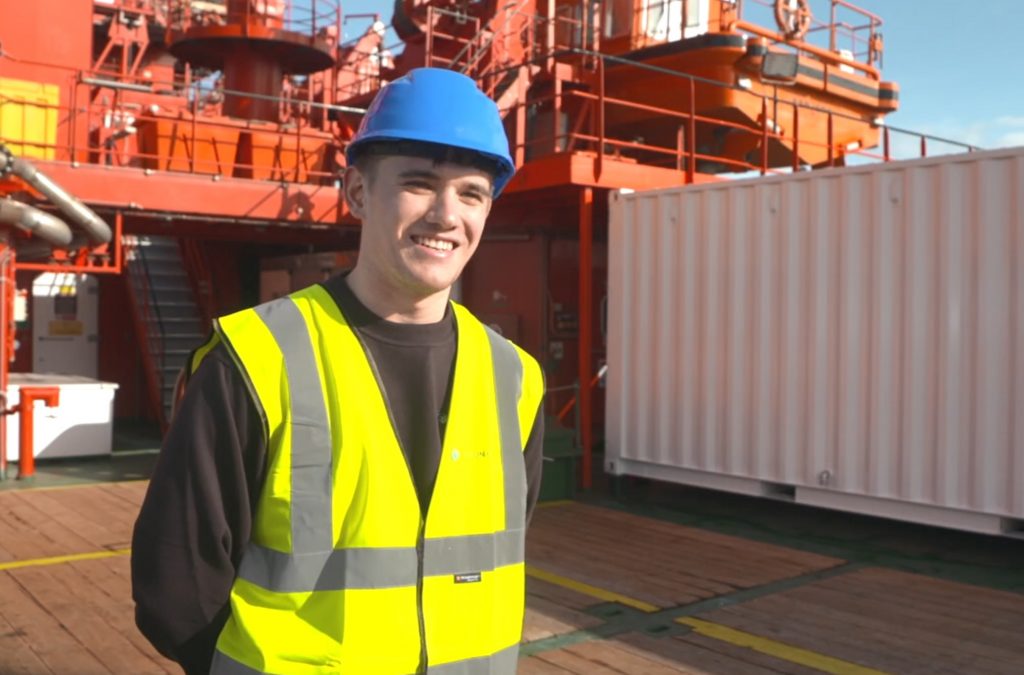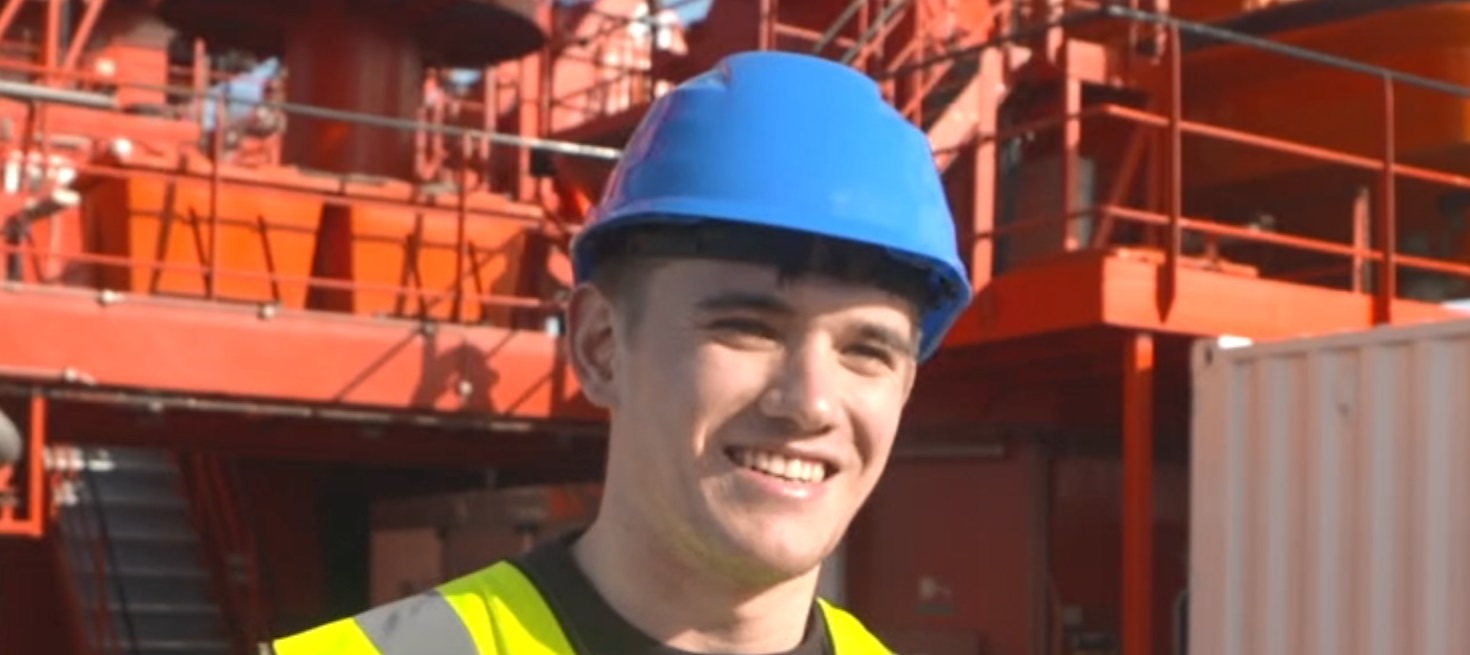
- Candidates will train at award-winning centre, piloted as innogy’s national training hub
- Earn-while-you-learn opportunity leads to skilled engineering qualifications(1)
Triton Knoll Offshore Wind Farm is seeking top local candidates for a new wind turbine technician apprenticeship, as it seeks to further boost its Grimsby-based project team for the future.
Candidates will train for three years and graduate as high-skilled technicians, with the opportunity to compete for long-term, future roles on the state-of-the-art Grimsby project, and other offshore wind farms owned by innogy.
innogy is the majority owner of Triton Knoll and will be supplying long term Operations & Maintenance services at Triton Knoll.
The recruitment drive comes as innogy pilots a national apprenticeship hub at Coleg Llandrillo, part of Grŵp Llandrillo Menai, in North Wales and where it has already successfully trained nearly 30 apprentices in the past, some of who now work on the Triton Knoll project.

Julian Garnsey, Project Director for Triton Knoll and innogy said: “This is a fantastic opportunity for local candidates to join our exciting, growing industry, and to work on some of the most up-to-date technology.
“Our apprentice graduates will come away with highly transferable skills, the opportunity to work on a great project close to home, as well as longer term opportunities to support the sector across the globe.
The training hub builds on innogy’s award-winning apprenticeship programme, which has been delivered at the North Wales college since 2012. The first two years of the apprenticeship programme will be based at the college in North Wales, with a third year of hands-on work experience at Triton Knoll Offshore Wind Farm, off the coast of Lincolnshire or at Rhyl Flats, off the coast of North Wales (see Apprenticeship Fact File, below)
Richard Sandford, Director of Offshore Investment & Asset Management for innogy Renewables UK, said: “We are thrilled to launch this pilot programme. Our extremely successful apprenticeship programme was first launched in 2012 to generate skilled technicians that could meet the needs of Gwynt y Môr. This course has since trained nearly 30 new apprentices producing high quality technicians who have been deployed, both locally and across the UK. This is why we are keen to trial this national hub as the need is clearly now wider than North Wales, with exciting opportunities for apprentices opening across the UK from Grimsby to Harwich.”
This year will see innogy recruit eight trainee wind turbine technicians, its biggest intake to date and all due to commence in September.
Richard continued: “Last year the Sector Deal committed to delivering training within the renewables sector and I’m pleased that we are able to deliver on this so soon. We are serious about developing a workforce to meet our needs by creating high quality vocational learning opportunities and this hub will do just that.”
The aim of the hub is to fill the gap when innogy builds out and operates its offshore wind pipeline. Successful apprentices will gain an NVQ and have the potential to work on some of the world’s largest wind farms.

Wind Turbine Technician Chris Hughes previously completed the innogy apprenticeship training and has now joined Triton Knoll, ready to take up a role within the Operations & Maintenance team once the project is fully operational. He said: “I’d really recommend this course to people. I’ve always preferred to be hands on in school, and so this course fitted me perfectly.
“It’s not a walk in the park by any means and you need to be prepared to train for quite some time away from home. But if you are willing to really knuckle down and give your full commitment to it, the end goal is so worth it and with job prospects for life.”
Chris is part of a growing intake of new and local people who are already finding jobs and new skills-training opportunities with the project. Triton Knoll recently recruited the first of a team of 70 people who will help make up its Operations & Maintenance team long term, and will be based out of the project’s new premises which are being constructed at Grimsby’s Royal Dock.
Shortlisted candidates will be invited to an assessment centre (subject to Government guidelines) prior to a final selection being made. Candidates are invited to apply online via https://jobs.innogy.com or tritonknoll.co.uk/jobs-skills-learning/ The deadline for applications is Friday 29th May.
Triton Knoll is a state-of-the-art, 857MW offshore wind farm, consisting of 90 of the world’s most powerful turbines, and representing a significant investment in new UK energy infrastructure. Located 32km off the Lincolnshire coast, Triton Knoll is the largest offshore wind farm currently in construction by innogy (2) and, once fully operational, will be capable generating renewable energy equivalent to the needs of over 800,000 typical UK households. (3)
For more information about the project, please visit: www.tritonknoll.co.uk
Media Contact
| Mark Fleming, innogy / Triton Knoll, Senior Public Relations Officer.
M: 07825 608096 / E: mark.fleming@tritonknoll.co.uk |
(1) Apprenticeship Fact File:
Course location – at Coleg Llandrillo, part of Grŵp Llandrillo Menai, North Wales
Course duration – 3 years
Learning split – 2 years in-class study; 1 year on site hands-on experience on some of the world’s most advanced offshore wind farms
Final qualifications – BTEC Level 3 General Engineering; City & Guilds Level 3 Electrical Power Engineering – Wind Turbine Maintenance; NVQ level 3 qualification in Wind turbine operations and maintenance.
EDITORS NOTES
(2) Triton Knoll Offshore Wind Farm is owned by innogy (59%), J-Power (25%) and Kansai Electric Power (16%), with innogy managing the construction as well as the long term operation and maintenance works, on behalf of its project partners.
(3) Energy Generation – It is estimated that the average annual generation expected at the site could be equivalent to the approximate domestic needs of an expected minimum of 800,000 average UK households. Energy predicted to be generated by the proposal is derived using wind speeds monitored in the local area and correlated with long term reference data. The energy capture predicted, and hence derived homes equivalent figure may change as further data are gathered. Equivalent homes supplied is based on an annual electricity consumption per home of 4100 kWh. This figure is supported by recent domestic electricity consumption data available from The Digest of UK Energy Statistics and household figures from the UK National Statistics Authority.

